Real results for global teams
Increase reach and revenue with measurable outcomes across your content lifecycle. Transifex combines AI, workflow automation, and in-context tools to deliver quality at speed.
Why choose Transifex for software localization
Transifex operates as the central system for software localization, orchestrating complex workflows across multiple products, teams, and markets from a single AI-powered platform. It centralizes content, connects to your stack, and scales translation across 100+ languages.
With Transifex AI and the Translation Quality Index (TQI), you get context-aware translations, automated post-editing, and real-time readiness scoring. Ship more localized product and marketing content while keeping terminology, tone, and structure consistent. If you need continuous localization, over-the-air updates, or code-based SDK delivery,
How to do software localization with Transifex
Connect and sync content
Connect repos, CMS, design tools, and code using API, CLI, and SDKs. Auto-detect strings from files or your app, sync updates continuously, and centralize assets like TM, glossaries, and style guides. Use GitHub/GitLab, Jira, Figma, and CMS connectors, plus webhooks to automate.
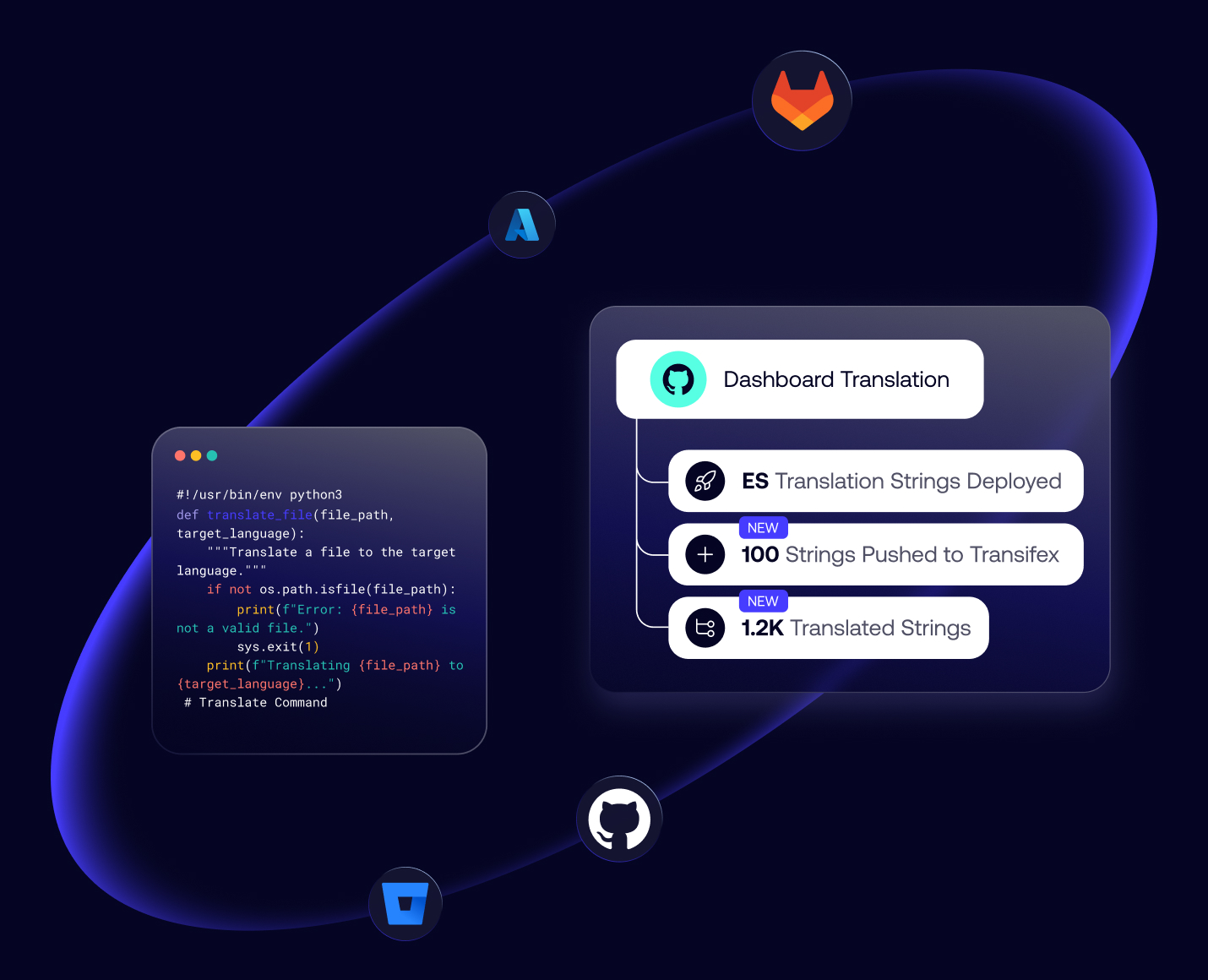
Translate with AI and TM
Use Transifex AI with AI Fillup for instant, brand-aware translations in 100+ languages. Transifex AI leverages your TM, glossaries, and style guide, and can generate editable assets if you don’t have them. Reuse 100% matches with Auto TM, surface fuzzy matches with guidance, and apply transcreation when creative copy needs it.
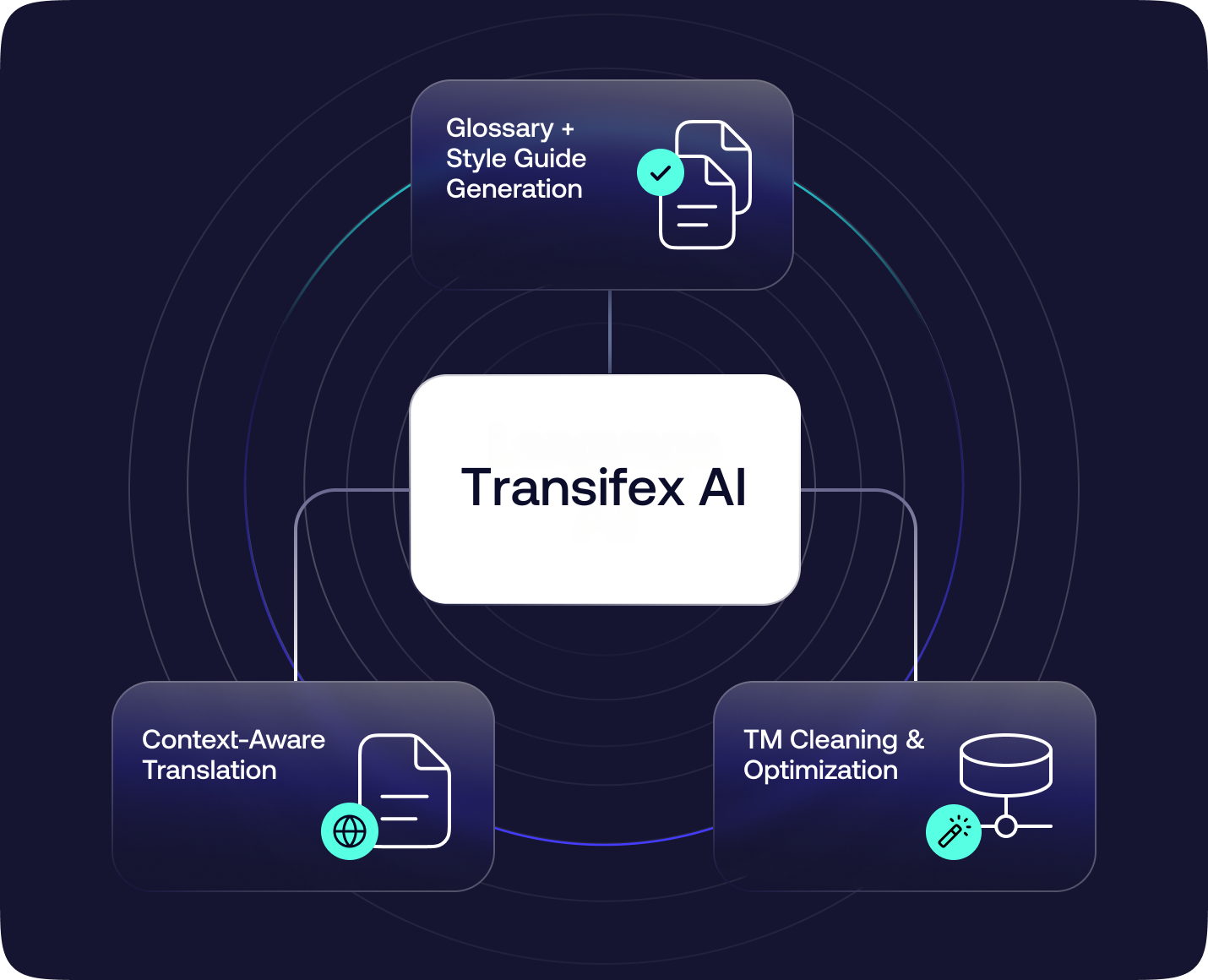
Review with quality automation
TQI evaluates each string in real time using AI-MQM checks, glossary enforcement, structural validations, and agreement across the top-performing LLMs. High scores auto-approve. Lower scores route to human review with pinpointed issues, context snippets, and suggested fixes.
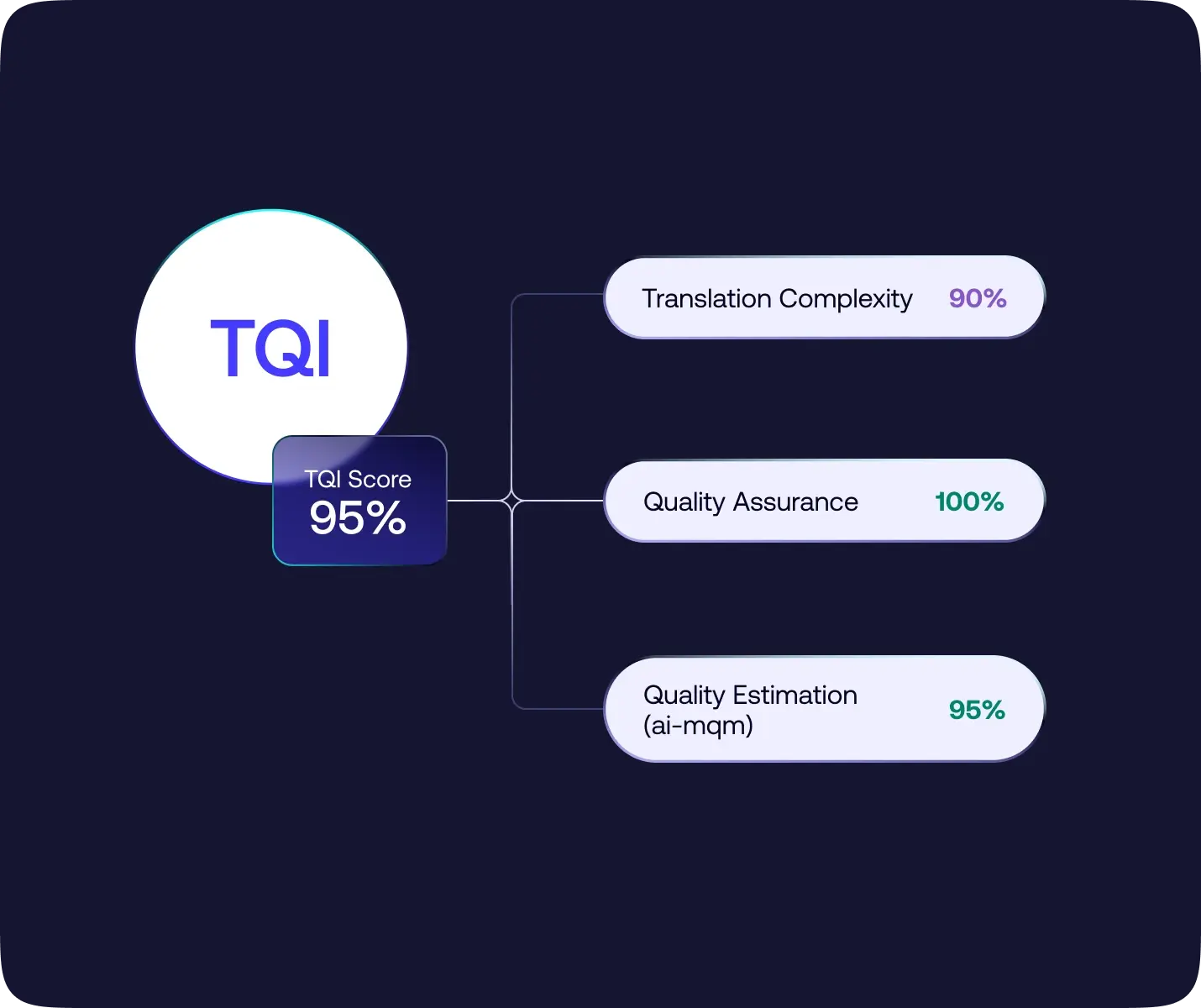
Publish over the air
Ship translations instantly via Transifex Live for websites or Transifex Native SDKs for apps. Use OTA publishing to update localized content without redeploys, keeping every market current. Translations are served via a fast content delivery service for low-latency updates.
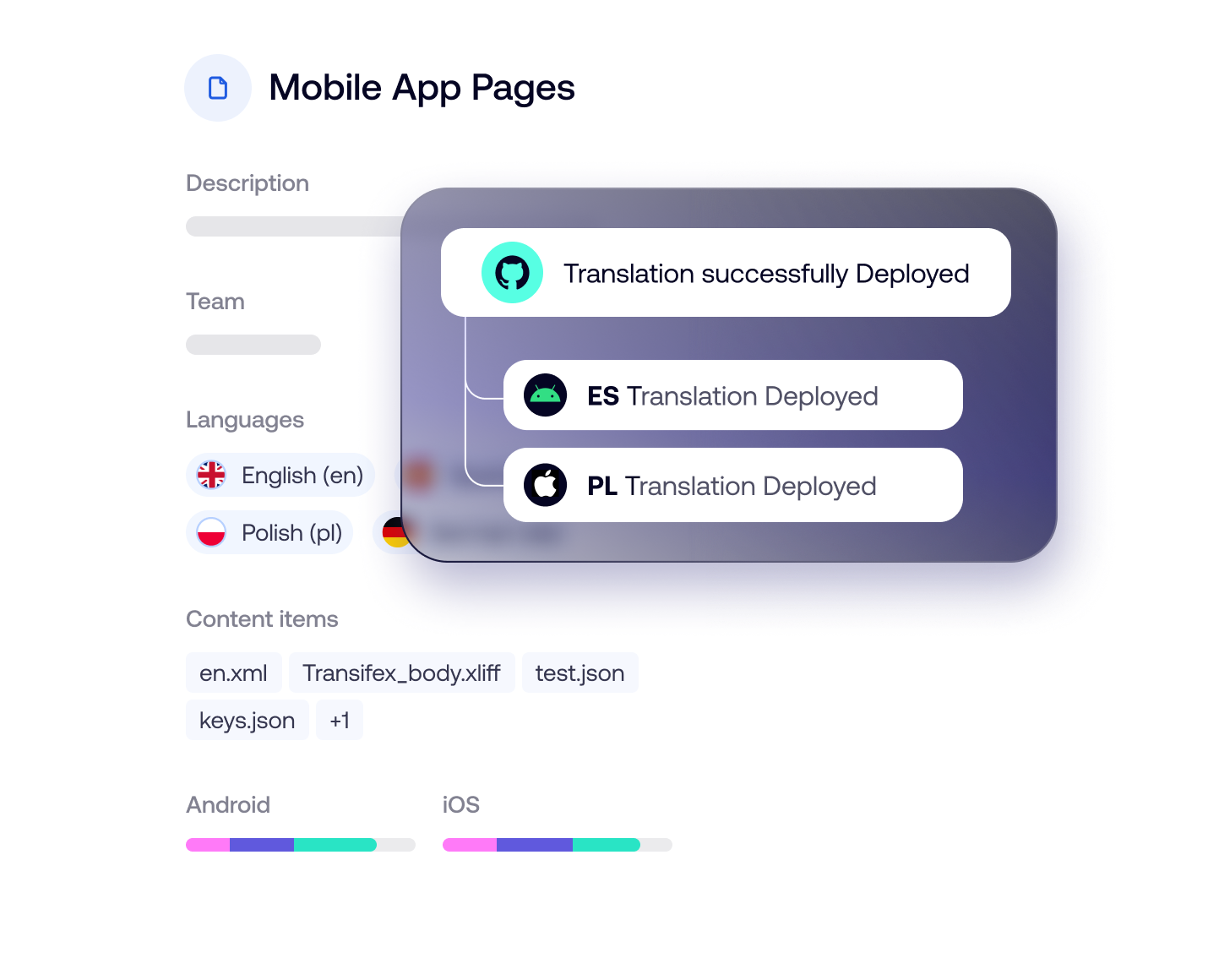




The outcomes that matter
Transifex turns localization into a growth driver by combining AI accuracy, workflow control, and developer-friendly delivery. Teams get faster releases, lower costs, and consistent brand voice across markets.
Quality at production speed
TQI automates quality decisions and post-editing, so more content goes live without manual bottlenecks. Consistency improves with enforced glossary and style rules.
Continuous localization for product teams
Sync strings with every commit, preview UI in context, and publish OTA. Keep localization aligned with sprints and releases.
In-context website translation
Translate on-page with Transifex Live, detect new content automatically, and keep SEO intact with localized URLs and metadata where supported.
Scalable workflows and governance
Define roles, automate steps, and integrate agencies or in-house linguists. Track progress and quality with analytics and string-level insights.
What our customers say

Yichi Chen
Product Manager, EventMobi
Faster content roll-out
With Transifex, we’ve been able to significantly reduce turnaround times for translations, enabling us to launch new features and products across all languages at the same time.

Julia
Sr Training Manager, Celonis
Less time spent on translations
Transifex has cut our time-to-market in half and accelerated our translation processes. It truly feels like we are one team, working together towards a common goal.

Dierk
Sr Manager Localization & Systems, Hubspot

Faster localization workflows
With Transifex, we’ve been able to significantly reduce turnaround times for translations, enabling us to launch new features and products across all languages at the same time.
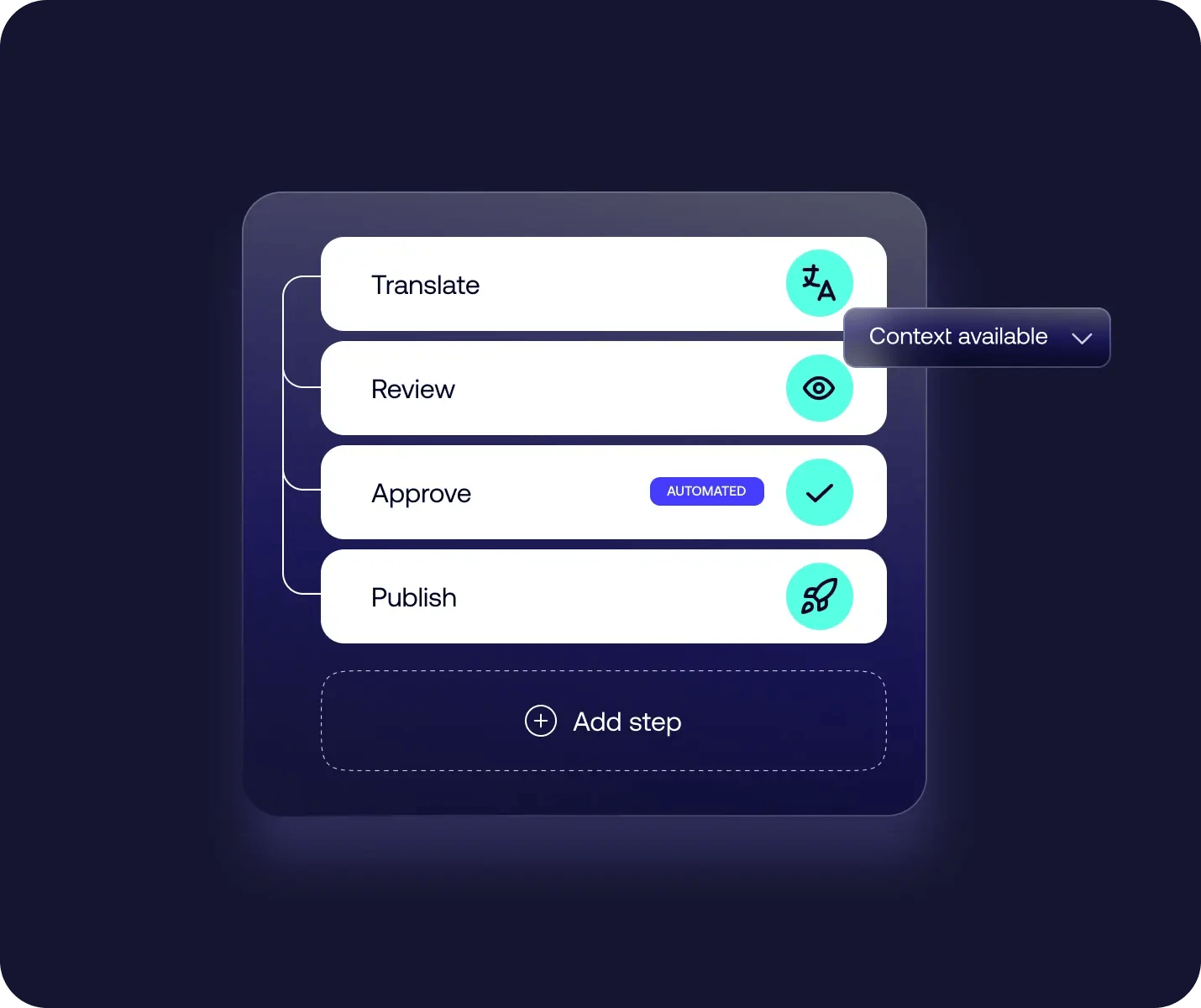
Solve messy processes with a smarter software localization platform
Teams struggle with scattered files, manual edits, and slow handoffs that delay releases and inflate costs. Content changes faster than translation can keep up. Quality slips without context and consistent checks. Transifex fixes this with centralized content, AI tuned to your brand, automated quality scoring (TQI), and OTA publishing for websites and apps. You get predictable workflows, fewer errors, and faster shipping across all languages.
Built for modern localization
AI translation that learns from you
Translation Memory and Auto TM
In-context website editing
Native SDKs for apps
Workflow automation and roles
Collaborative online editor
How Transifex fits your team
Transifex adapts to your process so teams collaborate without friction and keep releases moving across languages.
For product teams
Keep features and copy shipping on schedule with continuous localization and OTA updates.
- Align localization with sprints and releases
- Preview UI strings in context before launch
- Track readiness with clear quality and status
For developers
Integrate once and automate localization across environments.
- Use API, CLI, and Native SDKs
- Sync strings from source control and CI/CD
- Avoid redeploys with OTA publishing
- Use ICU message syntax and typed variables
For localization teams
Manage quality and consistency at scale with clear workflows.
- Enforce glossary and style guides across projects
- Automate approvals using TQI thresholds
- Collaborate in a real-time online editor
For marketing teams
Localize campaigns and web pages fast without engineering cycles.
- Use Transifex Live for on-page translation
- Maintain brand voice in every language
- Optimize for multilingual SEO where supported

Take your global content further with Transifex
Expand to more markets with quality you can measure and automation you can trust. Start fast and scale without complexity.

FAQs
Still got questions? Talk with the Transifex team to see how you can improve the quality of your Italian translations and save money.
What makes Transifex different from traditional TMS tools?
Transifex combines a full TMS with Transifex AI, in-context website translation, and developer SDKs. It centralizes localization work, automates quality with TQI, and supports continuous localization with OTA updates for web and apps.
How does TQI decide if a translation is production-ready?
TQI scores each string using AI-MQM, glossary adherence, structural checks, and agreement across the best available LLMs. High-scoring strings can publish automatically. Lower-scoring strings route to review with flagged errors, context snippets, and suggested fixes. Teams configure thresholds by content type.
Can we keep our brand voice across 100+ languages?
Yes. Transifex AI uses your TM, glossaries, and style guides to guide translations and can generate these assets if you lack them. TQI then post-edits and validates terminology and tone to preserve brand voice.
How does Transifex support developers and CI/CD?
Use API, CLI, and Transifex Native SDKs to sync strings, retrieve translations, and publish OTA. Connect to source control and pipelines so localization tracks code changes without manual file handling. ICU support and a CDS ensure low-latency delivery.
Does Transifex handle websites and apps differently?
For websites, Transifex Live enables in-context translation and OTA publishing with automatic content detection. For apps, Transifex Native delivers translations via SDK and a content delivery service for low-latency updates. Both keep content current without redeploys.
What languages and content types are supported?
Transifex supports 100+ languages and common file formats like JSON, PO, YAML, and XML. It handles CMS content, design strings from tools like Figma, software UI, docs, help centers, marketing pages, and catalogs with unified workflows and quality controls.
How does pricing relate to usage and scale?
Plans align with volume, features, and team needs. Start with a trial, then choose a plan that fits your scale and workflow. Our team can help map costs to expected ROI.
How quickly can we get started?
Most teams connect a project and ship first translations within days. Transifex Live and Native shorten setup by avoiding complex rebuilds. Import existing TM and glossaries for continuity, then set TQI thresholds to automate approvals and accelerate publishing.
Learn more about scaling your software localization efforts
Software localization is more than the translation of your product UI. Different language settings, plural forms, frameworks used and visual relevancy factors are only a few other things to consider.

























